INTERVIEW OF THE WEEK: TIM FERRY
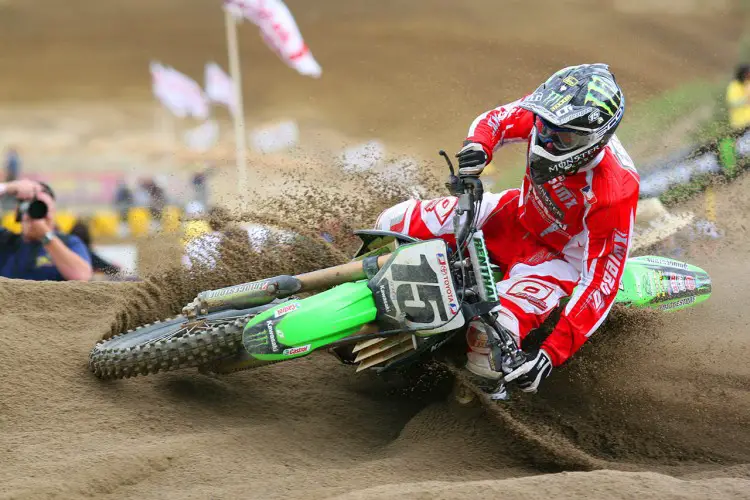 Tim Ferry–or “Red Dog” as he is fondly referred to by his fan base–had a celebrated career in the professional ranks. The Floridian won the 1997 AMA 125 East Supercross crown and finished inside the top five overall a whopping ten times in 18 seasons. Ferry retired at the end of 2009 after spending the final three years of his career at factory Kawasaki.
Tim Ferry–or “Red Dog” as he is fondly referred to by his fan base–had a celebrated career in the professional ranks. The Floridian won the 1997 AMA 125 East Supercross crown and finished inside the top five overall a whopping ten times in 18 seasons. Ferry retired at the end of 2009 after spending the final three years of his career at factory Kawasaki.
While Tim no longer gets paid to win races by the likes of factory Suzuki, Yamaha and Kawasaki, he’s still involved in the racing scene. Ferry has been working with Trey Canard since 2010, and he’s often seen around the paddock. When not at a Supercross or National, he’s at big amateur events supporting his son’s racing effort.
Would you like to know what Tim Ferry is up to? Are you interested in hearing about that infamous incident at Salt Lake City in 2003 with Ricky Carmichael? Or maybe you’d like his thoughts on who is the future of the 450 class? All of those questions are answered below.
By John Basher
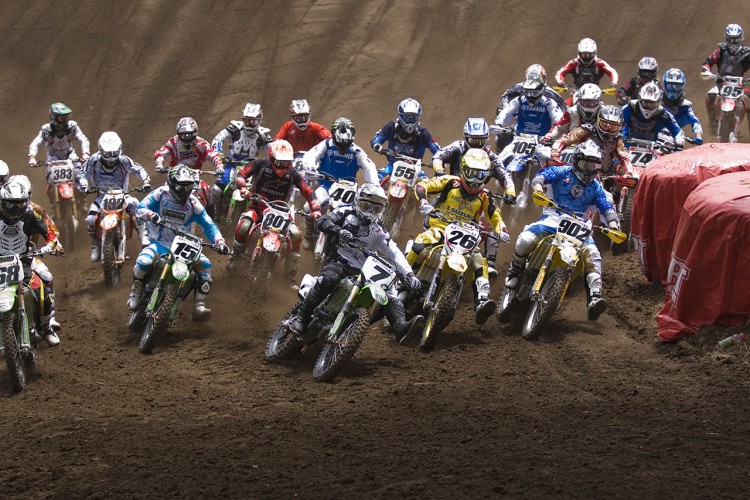 Tim Ferry (15) and his teammate, James Stewart (7) battle for the holeshot at Washougal in 2008. That was the summer Stewart went 24-0. Bubba partially had Ferry to thank, as Tim was instrumental in helping James with bike setup.
Tim Ferry (15) and his teammate, James Stewart (7) battle for the holeshot at Washougal in 2008. That was the summer Stewart went 24-0. Bubba partially had Ferry to thank, as Tim was instrumental in helping James with bike setup.
What have you been up to? I’ve been really busy, actually. Retired life hasn’t been quite what I thought it would be. I’m still working with Trey [Canard], so I’ve been going back and forth to the races. I have also gone back and forth to Oklahoma here and there. I’m also training Martin Davalos, Hayden Melross, and quite a few amateur riders.
Trey Canard has been fighting several injuries this Supercross series, so expectations have changed a bit since the beginning of the season. How has your relationship with Trey progressed through the years? We’ve been working together since 2010. This year has been a rough start to the season. He hurt his hand, and he’s also had a groin issue. It has been one thing after another for him, but he’s starting to come around. It’s hard to jump back in with the other guys when you’ve been injured. Trey will get back to where he should be in the next few rounds.
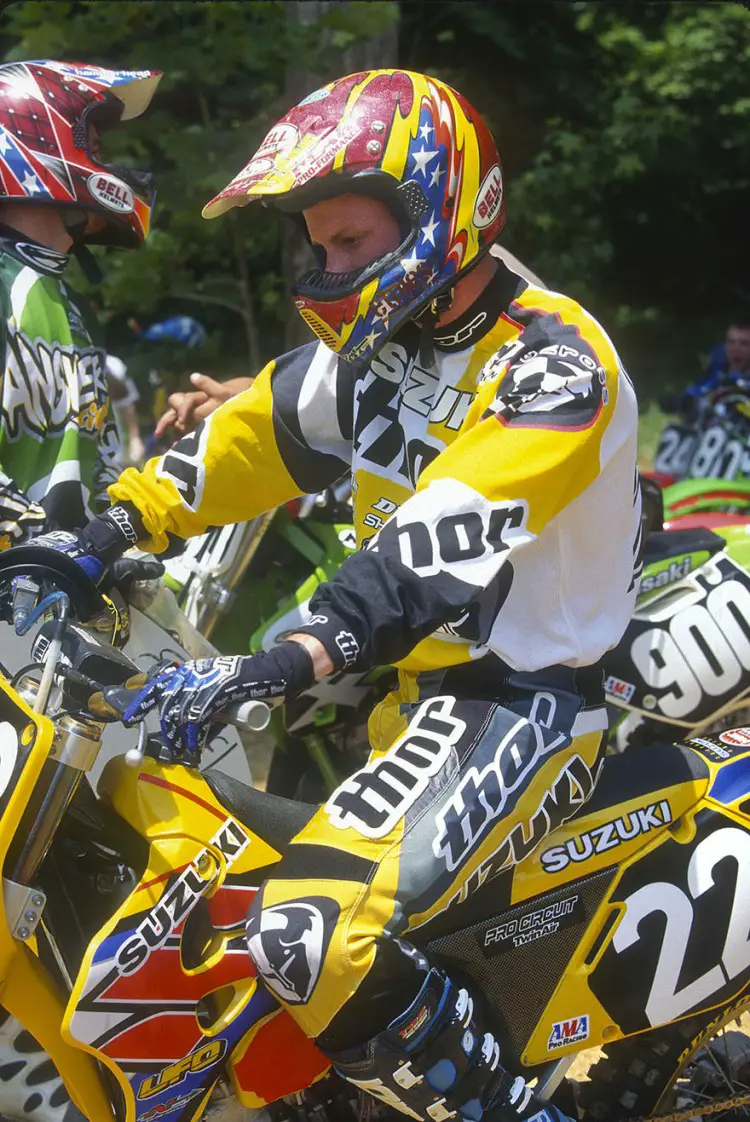 Tim Ferry gets in the zone during the 1997 AMA 125 Nationals aboard a factory Suzuki RM125. Check out those bottom triple clamp bolts.
Tim Ferry gets in the zone during the 1997 AMA 125 Nationals aboard a factory Suzuki RM125. Check out those bottom triple clamp bolts.
How do you balance your schedule in regard to traveling to Canard’s house in Oklahoma, and then also training riders at your place in Florida? It’s actually kind of tough [laughter]. Obviously Trey is really an easygoing person. I go with him to the races on the weekends, and every once in a while during the offseason I’ll spend the week with him in Oklahoma. It works out that I have a lot of free time in Florida to do my other stuff. My son also races, too. Working on my son’s bikes and going to the races with him keeps me just as busy as training guys.
Your son, Evan, is turning into quite the motocross racer. Did you push him into riding, or did he naturally pick it up as a hobby and want to continue? I was kind of against him riding in the beginning. I had raced for so long. I was at the end of my career, and I was ready to kick back a little bit. At the same time, I would never have stopped him from riding. His granddad is really into motocross, so when I was still racing professionally they would go ride. Evan loves riding, and I support him one hundred percent. We’re about to do qualifiers for Loretta’s, and several Amateur Nationals are coming up. I love going racing with him, and he has a lot of fun doing it. I’m not so sure that he loves racing yet, but he sure loves to ride a dirt bike. To me, that’s the most important thing. I do like that I can help him. I don’t know any other sports, and while I’m sure I could figure other sports out, motocross is a natural fit.
Does your son comprehend what you did as a professional racer? I think that he does now. He has raced at Loretta’s and is realizing how tough the competition is. We had the best result ever at Loretta’s this past year, and we finished ninth overall and sixth in one moto. That was really good for where he is with his riding. Evan asked me how many Loretta’s titles I won as an amateur, and I told him that I had won seven. That sank in. He’s realizing what I did in my career. He was also at the Motocross des Nations at Budds Creek in 2007, and he sees pictures from when he was there. He’s finally starting to grasp it.
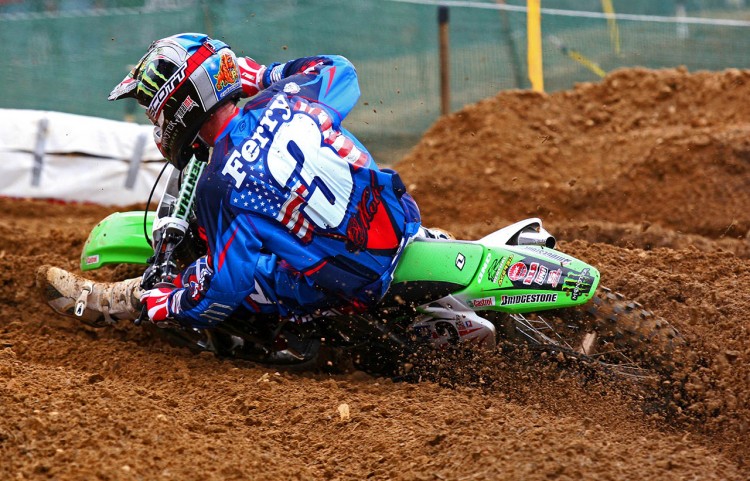 Ferry helped Team USA secure the Chamberlain Trophy at the MXDN in 2007. He was teamed up with Ricky Carmichael and Ryan Villopoto.
Ferry helped Team USA secure the Chamberlain Trophy at the MXDN in 2007. He was teamed up with Ricky Carmichael and Ryan Villopoto.
What was your greatest accomplishment as a racer? As far as results, I always think the Motocross des Nations races are still really big for me. As an American it’s hard to even get picked to be on the team. I was fortunate enough to get picked four times, race it three times, and win twice. Another biggest accomplishment is making it through a long career, and the fact that I still love being around the sport.
What was the most enjoyable year of your career? My favorite year was 2007. I had the Moto XXX ride in 2006. I was a privateer. It was a struggle after coming off so many great years at factory Yamaha. Then I got the factory ride at Kawasaki in 2007. Mike Fisher was the team manager, Mike Williamson was my mechanic, Kurt Rood was there, and the whole crew were like my age to an extent. Away from racing, we all had kids and could relate to one another. Sometimes after the races we would go out as a team and celebrate when we did well. Those are the times I’ll always remember.
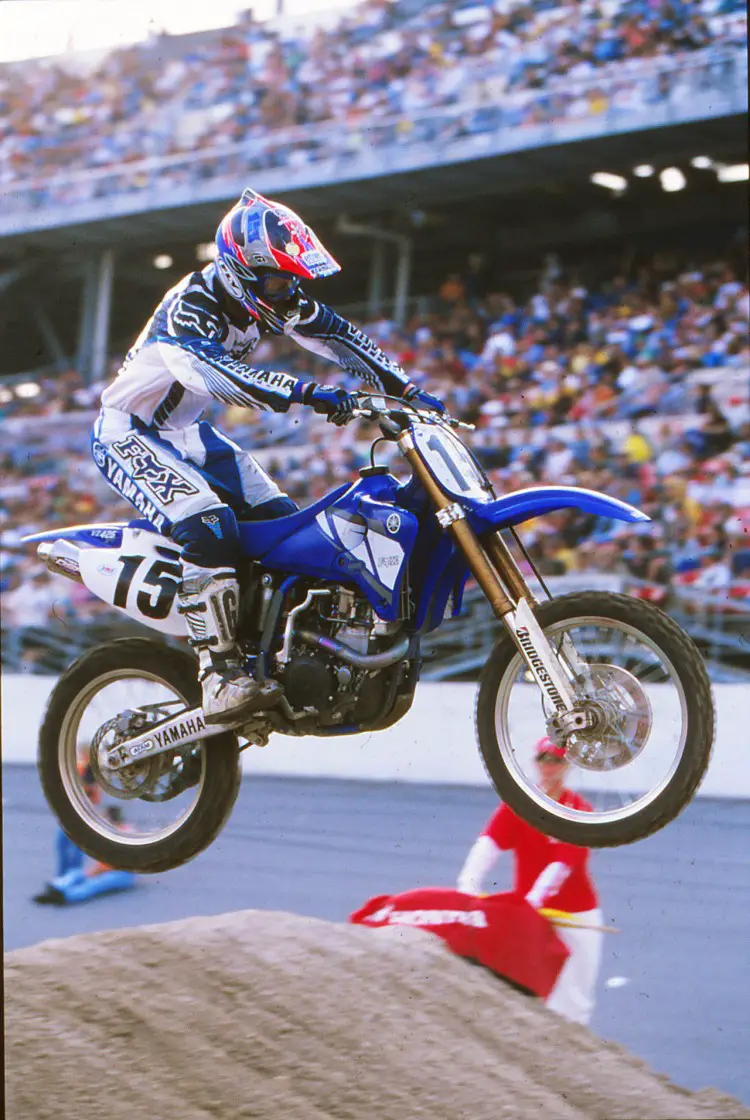 Ferry at the Daytona Supercross in 2001.
Ferry at the Daytona Supercross in 2001.
Are your memories from 2007 bittersweet? That year you won the Washougal National and were the front-runner for the 450 National title, but faded down the stretch and finished fourth in the standings. The night when Glen Helen was over I was pretty upset. I had fought really hard that day to win the title. I could feel that the momentum was on [Grant] Langston’s side, and so the title was slipping away from me. It was tough that night, but to be honest, I don’t ever think about losing that title. I had so many years of racing. That title, to me, wasn’t going to define me. Until you said it I hadn’t thought about that race for the championship.
Sorry for bringing it up! No, I don’t care! I felt at the end of that year that I had done the best I could possibly do. I wasn’t slacking on my training, and I was never lazy. I just got beat. Langston rode really well, and he was already the World Champion. I congratulated him. It doesn’t bother me one bit.
If you don’t mind me continuing then on the path of painful subjects, let’s talk about 1997 when you won the 125 East Supercross title, only to get dropped by factory Suzuki. You ended up with a privateer ride for 1998, and you also had to move up to the 250 class. Was the fact that you won a title and didn’t get rewarded with a factory offer a tough pill to swallow? Yeah, that was pretty tough. It was weird timing. Racing is different now than it was back then. I realize now that I wasn’t the caliber at that time to get one of the 250 rides. Still, to be the champion and not get a ride the next year was strange. I rode for Noleen Yamaha in 1998. If a rider won a title nowadays and didn’t get a factory ride, well then that would be a big deal. I was more disappointed in Suzuki’s effort for what they did for us in 1996 and 1997. The bikes weren’t that good, and they weren’t preparing us for the 250 class. We were a side show to the 250 program. Now, the involvement from the factory level with the Lites program is so much better. It’s not surprising that I didn’t get a factory ride back then. I wasn’t developed enough to make that transition up to the big class with the support that Suzuki provided at the time.
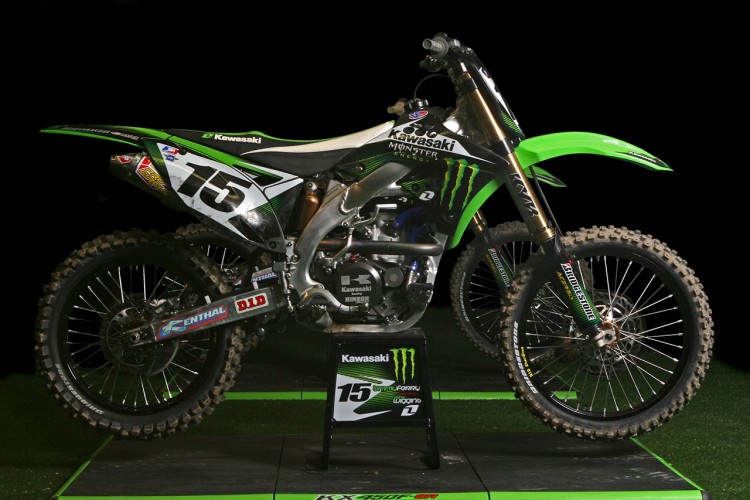 Ferry’s 2009 Kawasaki KX450SR. It was a great bike, although the 2007 model took the cake.
Ferry’s 2009 Kawasaki KX450SR. It was a great bike, although the 2007 model took the cake.
What’s the best race bike you competed on? As far as knowing I had a superior bike to everyone else, the 1995 Suzuki RM125 outdoor bike was unreal. It was like cheating in a way. As much as I’m bashing Suzuki, their 1995 bike was great. I felt like the Kawasaki KX450SR in 2007 and 2008 was a really good bike. It was great in the whoops. A lot of times I rode four-strokes in my prime years, and that’s when four-strokes weren’t the best.
The Kawasaki race technicians were always talking about how good of a test rider you were during your tenure at factory Kawasaki. Where did you learn bike setup skills? As a kid, I never rode anything but a stock bike. I didn’t have a modified bike until I was almost a Pro. We never even checked the sag or changed the suspension oil. The first title I won at Loretta’s I was on a bone-stock bike, and there weren’t even any stickers on it. It wasn’t like my Dad was like how I am with my kid’s bike. I’m a tinkerer. Maybe I learned bike setup because of my transition from factory teams to non-factory programs. I would try and get the non-factory bike to work the way I wanted it to. Another thing is that I never liked to ride out of my comfort zone. The only way I could ride at my top level was by making sure my bike was as good as it could be. I wasn’t a huge risk taker. That’s not my personality, and so it wasn’t in my riding style. Instead I always wanted the bike to be perfect. For that reason, when I lost the title in 2007, it wasn’t because of my bike. I remember flying to California in the middle of the outdoor series and testing different settings in order to find something better. I gave it my best effort.
Was the 2003 Salt Lake City Supercross, where you had that infamous run-in with Ricky Carmichael, the craziest race you were ever involved in? [Laughter] Yes. That was a very bizarre moment and night, for sure. None of it make sense even to this day. Chad [Reed] had been riding with me in Florida, but by that time he was already doing his own thing. Carmichael thought I was going to take him out to help Chad [win the 2003 Supercross title]. When you say it out loud it really doesn’t make any sense whatsoever. Carmichael apologized later on that night for having his melt-down, freak-out moment. We carried on from there. But, yeah, it was a really weird time. I would never take somebody out and tarnish my name. I would certainly never do it against Carmichael. He was in my wedding! Rivals or not, it’s not my personality to take someone out.
VIDEO: 2003 SALT LAKE CITY 250 SUPERCROSS
Switching things up, who is your pick to win the 250 East? I’m working with Davalos, so I’m going with him to win it. With that said, there’s quite a few guys who could step up and win. Martin has the experience, and that’s a good thing. There are some guys who have youth on their side and are willing to take chances. The 250 East is up in the air. The racer that wins the series will be the guy that’s most consistent.
On paper, the 250 East looks like a deeper field of talent than the 250 West. Do you agree? I might agree, because I thought the West was going to be more stacked. That’s usually the case with the West coast. There have been a few riders injured in that series, so it takes away a little bit from it. I personally like the 250 East racing. Maybe it’s because I won that series. Daytona is on the East, and that’s always a good one. The tracks always seem a bit more tricky in the East, because of the ruts and all that.
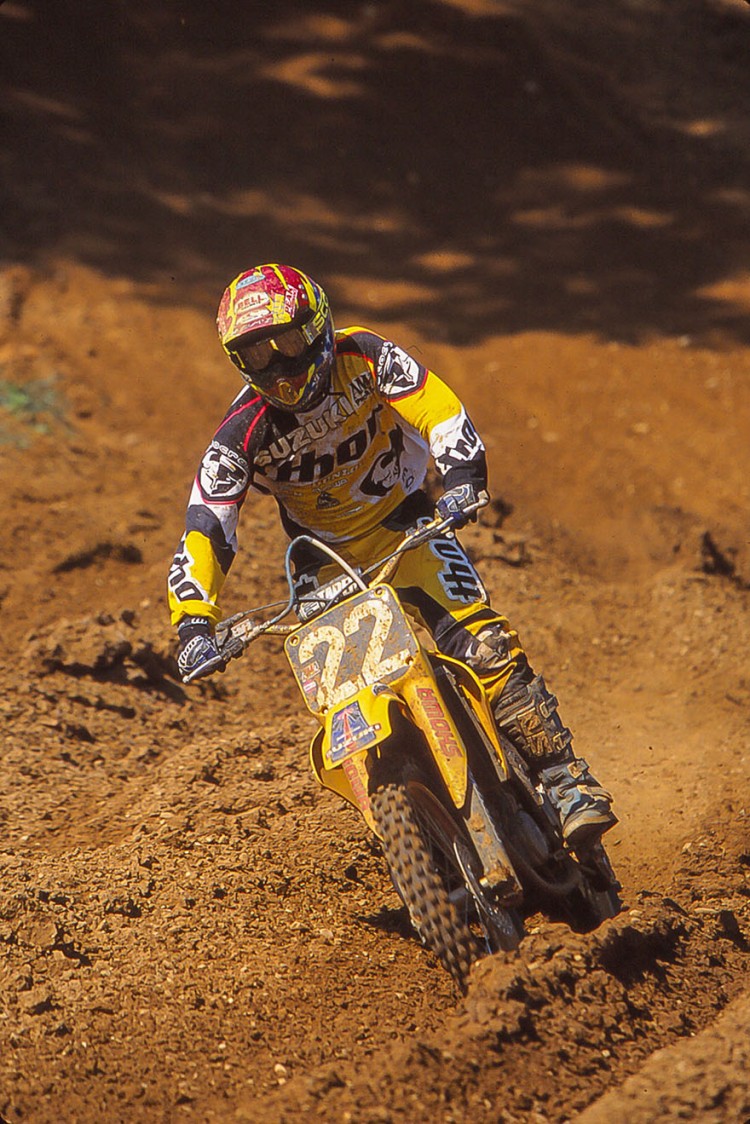 “Red Dog” in 1997.
“Red Dog” in 1997.
Of all the 250 Supercross racers, who will make a quick transition to the 450 class and be the future? That’s a tough question to answer. I would say that Cooper Webb is going to be very good on the 450. I saw him race with Chad Reed in Australia, and he handled himself very well. As for other riders, it’s so hard to tell until you see them get on a 450. Some guys will never ride a 450 that well, whether or not they win 250 titles or not. Some are held back by their size, while others just can’t duplicate that success on the bigger bike. It takes a little bit more to handle the 450, so when you’re really light and small, it’s a tough transition. Off the top of my head, [Blake] Baggett is one of those riders. He’s totally skilled, but he seems to be having a hard time making that jump up.
Thanks for your time, Tim, and congratulations on your rider, Martin Davalos, winning in Atlanta. Thanks, John.


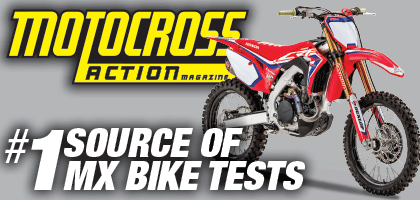

Comments are closed.